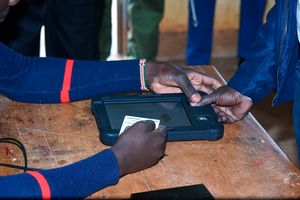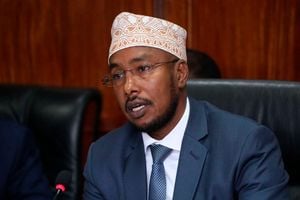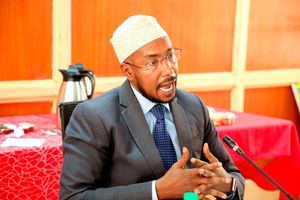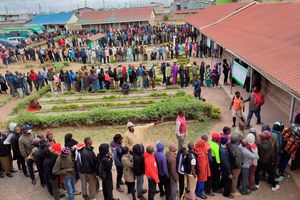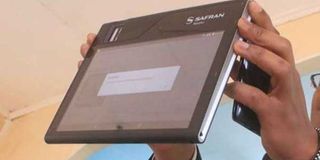
An IEBC official displays a KIEMS kit during a simulation process at the Nyeri County IEBC tallying centre at Moi Nyeri Complex on August 2, 2017.
It will cost the country at least Sh61 billion to undertake the 2027 General Election, according to a policy document the poll agency has tabled in Parliament in what promises to be the most expensive elections ever.
The budget is Sh19 billion more than the amount splashed in the 2022 polls by the Independent Electoral and Boundaries Commission (IEBC).
The request for election funds comes at a time when the country's healthcare system is in a mess. And the government has also not disbursed capitation to public schools, while the university funding model is in disarray.
The IEBC Deputy Chief Executive Officer Obadia Keitany, while appearing before the National Assembly Justice Legal Affairs Committee over the 2025 Budget Policy Statement (BPS), said that the General Election will be funded over three financial years — 2025/26, 2026/27 and 2027/28.
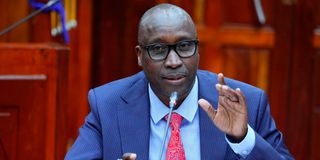
The Independent Electoral and Boundaries Commission IEBC deputy CEO Obadiah Keitany appearing before the Justice and Legal Affairs Committee on April 6, 2023.
Therefore, Mr Keitany said Sh15 billion be front-loaded to the 2025/26 financial year to facilitate “mainly voter registration and acquisition of the election technology software and hardware.”
General Election
“We are requesting that the funds be allocated in the 2025/26 financial year to prepare for the General Election, including early procurement of election materials, technology and voter registration,” said Mr Keitany, adding that the total required kits are 59,353, with 3,959 reserved for training.
Mr Keitany said the commission intends to retain the already existing poll register that has 23.3 million voters plus the projected 5.73 million new voters, translating to 28.03 million voters.
The polling stations are projected to increase by 9,169 to 55,393 in 2027 from the 46,229 polling stations in 2022. The number of voters per polling station is expected to remain 700.
The last three general elections, under the 2010 Constitution, have cost the country at least Sh121 billion.
It cost Sh42.6 billion to conduct the 2022 General Election, and the IEBC had asked for Sh49.9 billion. The 2017 polls cost Sh53.5 billion against the Sh61.8 billion requested by the poll agency while in the 2013 elections Sh24.3 billion was used, the commission’s budget was Sh24.7 billion.
IEBC Chief Executive Officer Marjan Hussein Marjan did not appear before the parliamentary committee to defend the commission’s expenditure plans. Rarieda Member of Parliament Otiende Amollo said that Mr Marjan was not taking his work seriously.
“Why didn’t the CEO come before this committee to defend the budget? Is the courtesy call he paid elsewhere more important than appearing here?” Dr Amollo asked.
Committee chairperson Gitonga Murugara (Tharaka MP) also expressed displeasure with Mr Marjan’s absence.
“We are concerned about his failure to appear before this committee,” said Mr Murugara.
Kibwezi West MP Mwengi Mutuse demanded a breakdown of the election cost per registered voter.
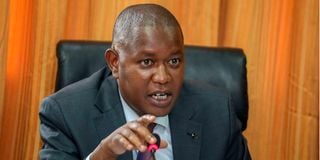
Kibwezi East MP Mutuse Mwengi.
The committee learnt that the commission has not been able to recruit new voters since the 2022 General Election despite the law providing for continuous voter registration.
Though not included in the estimates of expenditure, the commission expects to spend Sh490 million on by-elections. The seats that are up for grabs are; Senate (1), National Assembly (4), and county assemblies (9).
Committee members raised issue with the proposal to allocate Sh7.04 billion for the acquisition of new 45,000 Kenya Integrated Election Management (Kiems) kits.
Dr Amollo and Mr Mutuse raised questions about the money required for the procurement of the Kiems kits, but Dadaab MP Farah Maalim justified the need for the new kits.
“What is the need of replacing the kits when they are able to work?” Mr Mutuse asked.
This prompted committee chairman Mr Murugara to demand that a comprehensive expert report on the status of the current kits be prepared.
Deputy IEBC CEO Ruth Kulundu told the committee that the kits were procured for the 2017 General Election and come 2027, they will be more than 10 years old, and, therefore, obsolete.
“Any technology beyond 10 years is obsolete. We cannot use the kits for the 2027 General Election and that is why we need to replace them,” said Ms Kulundu, noting that the cost of replacing a kit includes, among other things, installation of software and procurement of licences from the providers.
Mr Maalim vouched for the replacement of the kits, noting that technology gets old and must be replaced.
Proper election
“Technology becomes obsolete and we need a new one for a proper election,” said Mr Maalim adding: “Saying that we stick with technology procured 10 years ago worries me.”
The MP said that politicians are happy with a system that does not work “so that they can steal”.
“We want state-of-the-art technology that is fool proof. Do not recycle something that has been there for more than 10 years,” said the Dadaab MP.
The safety of the IEBC Kiems kits has always been an issue, with Auditor-General Nancy Gathungu flagging the theft of kits as contained in her report on the accounts of IEBC for the 2020/21 financial year.
An IEBC document presented to the Public Accounts Committee (PAC) in 2023, in response to the audit issues, revealed how the commission lost election equipment worth billions of shillings that contained crucial data in areas considered ODM leader Raila Odinga’s strongholds.
The document presented by the IEBC CEO Mr Marjan raises issues on the credibility of the country’s past elections.
The document lists Kisumu County warehouse, Muhoroni, Emuhaya, Karachuonyo, Kajiado North and Nyando as the affected constituencies in the theft.
He said that the theft may have happened between 2013 and 2021, and it includes the loss of 952 Electronic Voter Identification System (EVID) laptops, 125 Biometric Voter Registration (BVR) kits, and 1,315 hard disks.
In some instances, the theft occurred just after the mass registration of voters in some areas and just a few months to the 2022 General Election.
At Kisumu County warehouse, 952 EVID laptops were stolen, in Emuhaya four laptops and two power cables, two laptops in Nyando, 31 BVR laptops and 45 chargers in Karachuonyo and two Dell laptops and a CVR server in Kajiado North Constituency.
In Muhoroni Constituency one Dell laptop, a heavy duty military grade suitcase, two fingerprint scanners, three flash disks, a back pack, a laptop charger, two Logitech cameras and a USB hub were stolen in 2021, months to the August 9, 2022 General Election.
Dell laptops
There was also theft of 21 Dell laptops and four generators in Tharaka-Nithi, in Marakwet West Constituency 26 EVIDS were lost and in Nandi County warehouse- 41 laptops, 10 fingerprint scanners, seven logistics cameras, 104 rechargeable batteries, three generators and 23 full BVR kits were stolen.

An IEBC official displays a KIEMS kit during a simulation process at the Nyeri County IEBC tallying centre at Moi Nyeri Complex on August 2, 2017.
Apart from Kiems kits, the commission also requires Sh15.6 billion for wages, Sh7 billion for continuous voter registration and voter verification exercise in the 2025/26 and 2026/27 financial years. The voter registration drive seeks to register 5.7 new voters.
The other resource requirement for the election is Sh6 billion for the procurement of ballot papers, Sh3.61 billion for the procurement of election materials, Sh3.2 billion for stakeholder engagements and Sh2.7 billion for training of election officials.
In addition, Sh2.6 billion is needed for the upgrade and maintenance of election systems, Sh3.82 billion for transport, Sh1.2 billion for meals, Sh1.3 billion for the purchase of motor vehicles, Sh1.1 billion each for legal petitions and ESAP and risk registration.
Mr Keitany told MPs that although the commission has Sh7 billion set aside for the delimitation of electoral boundaries, the funds were not included in the Budget Policy Statement.
“We haven’t included the funds in the estimates because we don’t not know what the Supreme Court’s determination on an advisory we sought will be,” said Mr Obadia.
The constitutional timelines in boundary delimitation were frustrated due to the lack of commissioners following the expiry of their mandate and the resignation of others.
The vacancies at the seven-member IEBC arose after the tenure of the chairman — the late Wafula Chebukati and members Abdi Guliye and Boya Molu ended in January 2023.
Three other commissioners —Ms Juliana Cherera (Vice Chairperson) and members Mr Justus Nyangaya and Mr Francis Wanderi were forced out of office through political pressure immediately after the August 9, 2022 election, while Ms Irene Masit was removed by a tribunal.

